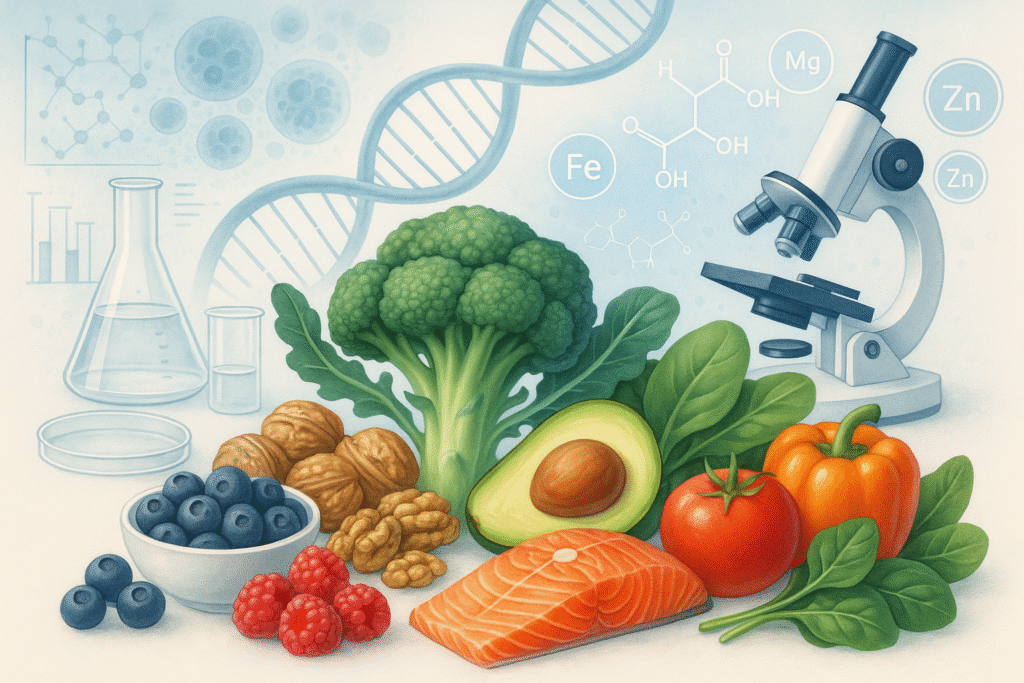Nutritional Science: Unlocking Your Body's Potential
Have you ever stopped to marvel at the intricate dance happening within your body every single second? From the beating of your heart to the thoughts forming in your mind, every function relies on a constant supply of energy and building blocks. And where do these come from? The food we eat. This profound connection between what's on our plate and how our bodies perform is the essence of nutritional science.
It's a field that's constantly evolving, moving beyond simple calorie counting to explore the complex interactions between nutrients, genes, and overall well-being. My gentle approach to nutrition is rooted in this science, aiming to demystify complex concepts and translate them into practical wisdom. Let's explore how understanding the fundamentals of nutritional science can empower you to unlock your body's full potential.
Unraveling the Concept - The Symphony of Nutrients
Nutritional science is the study of these instruments and their interplay. It investigates how food components are digested, absorbed, metabolized, and utilized by the body, and how they impact health and disease. For instance, research in the Journal of Nutritional Biochemistry consistently highlights the role of specific micronutrients, like zinc and selenium, in supporting immune function and protecting against oxidative stress.
A key area within nutritional science is nutrigenomics, which explores the fascinating relationship between our genes and our diet. Your genetic blueprint can influence how you respond to certain foods, how efficiently you metabolize nutrients, and even your predisposition to certain health conditions. This means that while general nutritional guidelines are valuable, a truly optimized approach often considers individual genetic variations.
Some individuals may have a genetic variant that makes them less efficient at converting alpha-linolenic acid (ALA) from plant sources into the beneficial EPA and DHA omega-3 fatty acids, suggesting a greater need for direct sources like fatty fish or algal oil.
Understanding nutritional science isn't about rigid rules; it's about gaining clarity. It's about moving beyond fads and marketing claims to appreciate the profound, evidence-based ways food influences every aspect of our being. It empowers us to make conscious choices, not out of fear or restriction, but out of a deep understanding of what truly nourishes us.
Practical Application - Translating Science into Daily Choices
1. Embrace Micronutrient Diversity
While macronutrients provide energy, it's the micronutrients that enable thousands of biochemical reactions essential for life. Think of a colorful plate: the reds of tomatoes (lycopene), the greens of spinach (folate, vitamin K), the purples of berries (anthocyanins), and the oranges of carrots (beta-carotene) all represent different families of beneficial compounds. Aim for a rainbow of fruits and vegetables daily to ensure a broad spectrum of micronutrients.
2. Understand Bioavailability
It's not just what you eat, but what your body can absorb and utilize. Iron from plant sources (non-heme iron) is better absorbed when consumed with vitamin C-rich foods. Cooking certain vegetables, like carrots or tomatoes, can increase the bioavailability of their fat-soluble antioxidants. Pairing healthy fats with fat-soluble vitamins (A, D, E, K) also enhances their absorption.
3. The Gut-Brain Axis: A Two-Way Street
Our understanding of the gut microbiome has revolutionized nutritional science. Trillions of microorganisms reside in our gut, influencing everything from digestion and nutrient absorption to immune function and mood. A diet rich in fiber (prebiotics) and fermented foods (probiotics) supports a healthy gut microbiome, which in turn communicates with the brain via the gut-brain axis. This connection highlights how nourishing your gut can positively impact your mental and emotional well-being.
4. Personalized Nutrition: Listening to Your Body and Your Genes
While general guidelines are a good starting point, true nutritional optimization often involves personalization. Pay attention to how different foods make you feel. Do you feel energized or sluggish after certain meals? Consider consulting with a qualified nutritionist who can help you explore personalized approaches, potentially including nutrigenomic testing, to tailor your diet to your unique genetic makeup and health goals.
Myths and Facts - Demystifying Nutritional Science
Myth 1: "All calories are created equal."
The Truth: While a calorie is a unit of energy, the source of those calories profoundly impacts your body. 100 calories from an apple (fiber, vitamins, antioxidants) behave very differently in your body than 100 calories from a sugary soda (empty calories, rapid blood sugar spike). Nutritional science emphasizes the quality and nutrient density of calories, not just the quantity.
Myth 2: "Nutritional science is too complicated for the average person."
The Truth: While the underlying mechanisms can be complex, the practical applications are often simple. My goal is to translate this complexity into accessible, actionable advice. You don't need a PhD to understand that eating whole, unprocessed foods, prioritizing plants, and listening to your body are powerful principles rooted in sound science.
Conclusion: Empowering Your Health Journey with Knowledge
Remember: eating is a biological act, but it's also an emotional one. Let's nourish both. Nutritional science is not just an academic discipline; it's a powerful tool for self-empowerment. By understanding the fundamental principles of how food interacts with your body, you gain the ability to make conscious, informed choices that lead to lasting health and vitality.
Embrace the journey of learning about your body and its nutritional needs. Every meal is an opportunity to fuel your cells, support your systems, and cultivate a deeper connection with your well-being. Let curiosity be your guide, and allow the wisdom of science to illuminate your path to optimal health.
May every food choice be a conscious step toward your integral well-being. Take care of yourself with kindness, and let the fascinating world of nutritional science be your gentle companion.


